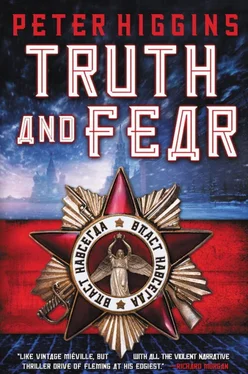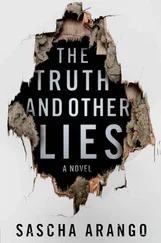At last the coast fell suddenly away behind them and they were over the sea, but the railway plunged on, carried on concrete piers. The track stretched ahead of them, cutting low and arrow-straight across the dark waters to the distant vanishing point. Squadrons of seabirds swept low over the waves, floated in speckled rafts, and lined the concrete parapets of the endless viaduct, roosting.
‘That is the Dead Bridge,’ said Gretskaya. ‘It was built by penal labour. Men, women, even children worked on it. There are hundreds of bodies under the water, thousands maybe, all drowned, frozen, starved, dead of exhaustion. The eels and the fishes get fat on the bodies and the birds get fat on the fish.’
Ahead of them there was no horizon. The sea merged with the sky, diffuse and indeterminate and in the deep distance the Dead Bridge narrowed and faded as if into the air. The Kotik roared on.
After half an hour or so, above the place where the railway viaduct still disappeared into the distance, a paler colourless wash came slowly forward, separated itself from the sky and resolved into a distant mountain, its peak buried in cloud, its base lost in mist.
‘That’s it,’ said Gretskaya. ‘That’s where we’re going. Novaya Zima.’ She swung the Kotik away to the north-east, climbing until the railway was out of sight, then turned round, dropped down to a hundred feet and cut the throttle.
And then they were gliding, the wind hissing through the struts, the rotor blades turning slowly. Lom could see small scattered rafts of ice floating on the water below them, rising and falling with the swell.
‘I’ll come in low and quiet,’ Gretskaya said. ‘No one will know we’re there.’
The island of Novaya Zima was a spine of dark hills ridged with snow, rising higher to the north, towards the still-distant mountain. The lower slopes were covered with trees: a dark monotonous woodland that rolled away from the hills until it met the shore. The seaplane skimmed onwards. The black wall of trees widened and rose to meet them. Gretskaya dropped the tail and they came down, bouncing a couple of times off the swell and settling in a long subsiding skid across the water. She opened the throttle slightly and motored towards the narrow shoreline, a ten-yard strip between the water and the edge of the woods. The seaplane’s nose beached gently a couple of yards out.
Gretskaya slid the cockpit open. She kept the engine running.
‘Go,’ she said. ‘Quickly. Go.’
Lom climbed out, dropped to his waist in freezing pine-green water and waded ashore. It was a steep climb, soft mud sucking at his feet. He almost lost his shoes. The beach was an unstable mass of twigs and mouldering needles and leaves, thickly matted with rotting seaweed. His feet broke the surface with every step, dislodging an appalling stench and clouds of tiny black flies that buzzed angrily at his face and neck. He stumbled and fell forward, plunging his hands elbow-deep into the high tideline.
‘Fuck,’ he muttered to himself. ‘Fuck. Fuck.’ It was bitterly cold.
He turned when he reached the trees. Florian was coming up the beach behind him, a small canvas knapsack slung from one shoulder by a narrow leather strap. Gretskaya had already pulled the Kotik back and was swinging it round to face out to sea. The roar of the engine rolled along the shore as she raced away, leaving a widening wake, and lifted into the sky.
The woodland was a dim, perspectiveless, muted labyrinth of widely spaced birch and pine. Resinous. Twilit. Snow-carpeted. Directionless. Florian seemed to know where he was going: he set off quickly, moving in as straight a line as was possible, away from the sea.
Lom followed.
‘We must get clear of the landing place,’ said Florian. The moss and the snow and the trees drained all echo, making his voice sound drab and flat. ‘We cannot light a fire until it is dark.’ He fished a twist of paper out of his pocket. It was filled with solid dark pieces of sugar. ‘Here,’ he said, holding one out. ‘Eat this. We go west until we strike the railway. Then we follow it north wherever it goes. OK?’
‘How far?’ said Lom.
‘To the railway? Ten or twenty miles. Not more. After that, who knows? We follow the track to its end, wherever that is. The south island is a hundred and twenty miles long and fifty wide at the waist, but I doubt we will have to go so far.’
‘What we’re looking for is on the south island? Why not the north?’
‘I think not the north. This island sits across a current of warmer water that flows from the west; the north island does not. It is under permanent ice, glaciers come down from the mountains.’
Florian, in his sombre suit, dark overcoat and astrakhan hat, the knapsack on his back, moved with fast and sure-footed noiseless grace. Lom jogged and stumbled behind him. The Blok 15 was a solid weight in his pocket. He carried nothing else. Shallow streams crossed their path, ice-fringed water running fast over mud and gravel, turning aside and deepening into moss- and root-edged pools. They drank and washed the stinking smears of the shoreline from their clothes. Lom plunged his face into the freezing water and sluiced his matted hair, then sat on a fallen trunk to wipe his eyes with his sleeve. When he looked up he saw the wolves. They were moving under the tree-shadow, silent and indistinct as moths. One turned its face towards him. Wolf eyes. Unhurried, considering.
‘Wolf,’ he called to Florian in a low voice.
He would fight, if he had to. Wolf mouth on his face, his arm in a wolf mouth, fingers in a wolf throat, digging. Dragging his revolver from his pocket, firing it into wolf belly. Firing again. Blood and blood. Without hope, he would turn and fight.
‘I see them,’ said Florian. ‘There are others behind us. They are following.’
Lom jerked round but there was nothing to see.
‘Why didn’t you say before?’
‘They will not trouble us while I am here,’ said Florian. ‘They are not hunting, they are curious, that’s all. But do not go far alone. Not without me.’
All afternoon and into the evening they pushed on through the trees, Florian moving fast and confidently, Lom struggling to keep up. From time to time he looked for wolves but did not see them again.
They broke out onto the edge of the railway track suddenly, without warning. It stretched away to right and left, twin parallel rails. The massive sleepers and ten-foot gauge of a major freight line. On either side of the track the trees had been cut down and cleared five yards back from the line. It was freshly done work, the toppled trees stacked neatly, the ground scattered with raw yellow axe chippings, the scent of fresh-cut timber in the air. An inch-deep covering of snow. It made the going easier. They turned right and began to jog along beside the rails.
They had been going steadily for about an hour when Florian stopped suddenly.
‘Train,’ he said. ‘Do you hear? A train is coming.’
‘I can’t hear anything,’ said Lom. He was breathing hard. Heart pounding in his chest.
‘Get out of sight,’ said Florian urgently.
Lom followed him into the dimness under the trees and they hunched down low to wait. Eventually he heard the rumbling in the rails, rising in pitch to a squeal as the train got closer. It was approaching from behind them. He could hear it now, a locomotive under full steam. The train roared into view and thundered past, close enough to see the moustache glistening on the engineer’s face in the firebox glow and catch the smell of hot iron and burning coal. Iron wheels high as a man is tall. Truck after truck followed the engine, ten, twenty, thirty of them, wooden-sided, windowless, each as long as a barn. Lom recognised them. The long trains. He had seen such trains, hundreds of them, waiting in rows in the Wieland marshalling yards. They looked like cattle trucks but they weren’t for carrying cattle.
Читать дальше


![Кэмерон Доки - Правда и ее последствия[Truth and Consequences]](/books/79610/kemeron-doki-pravda-i-ee-posledstviya-truth-and-con-thumb.webp)









